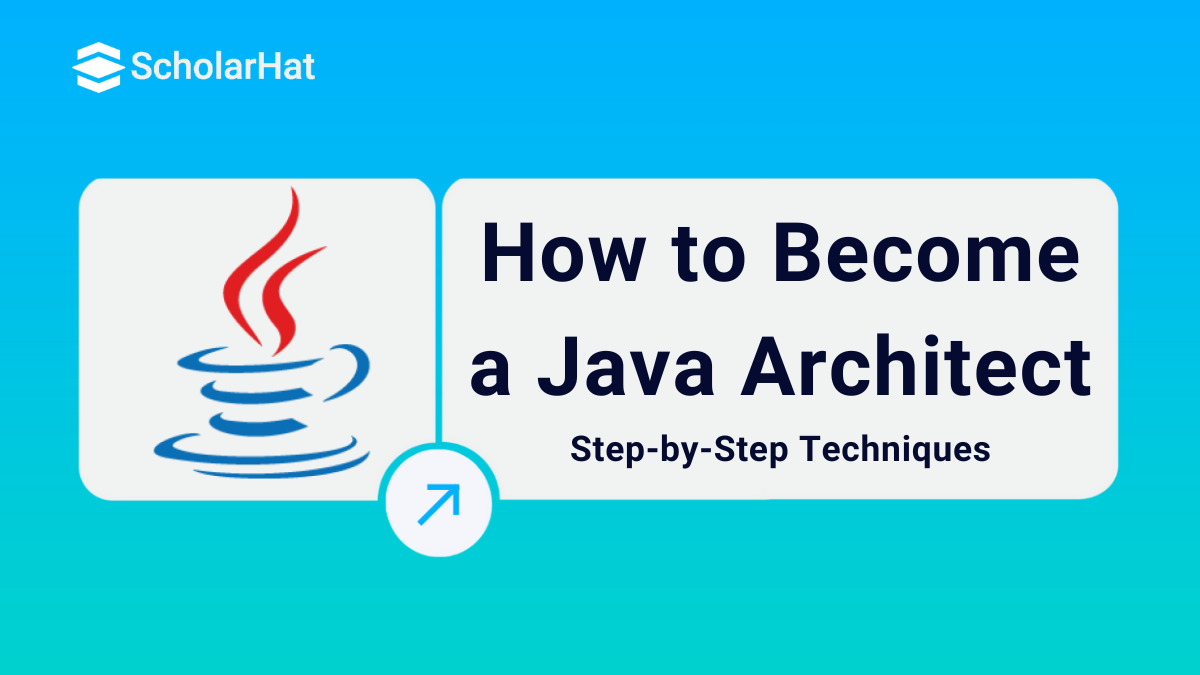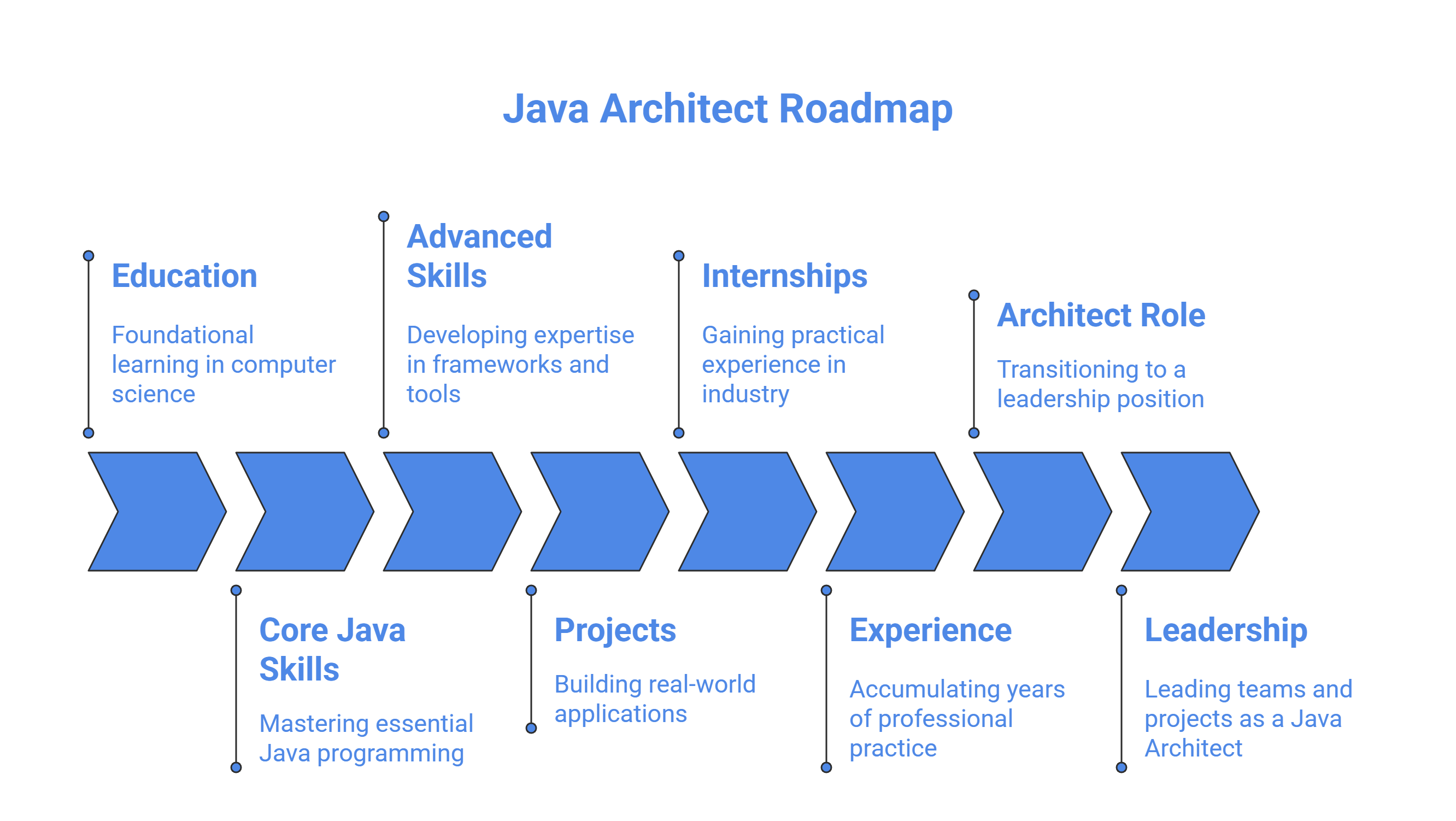06
MarHow to Become a Java Architect: Step-by-Step Techniques
To become a Java Architect, you should first learn Java well and get plenty of practice in software development. It's also important to understand how to design software systems and use common patterns. Learn about Java tools like Spring and Hibernate, and gain skills in cloud computing, DevOps, and combining different systems. Good communication and leadership skills are also very important for this role.
In this Java tutorial, we will explore a clear, actionable roadmap to becoming a Java Architect, which includes the necessary skills, tools, certifications, and real-world tips to advance from Java developer to architectural leadership. Entry-level Java developers earn ₹5–8 LPA, but skilled ones hit ₹15 LPA+. Don’t settle for less. Enroll now in our Free Java Course to aim higher.
How to become a Java Architect: Step by Step Guide?
Becoming a Java Architect requires three things:
- Right Education
- Right Skills
- And some years of Experience.
This is the step-by-step guide to becoming a Java architect:
Only 2% of Java Developers become Solution Architects. Don’t get left behind. Enroll now in our Java Architect Course and secure your career growth |
Step 1: Choose your direction
Start your journey with a degree in computer science. You may pursue a bachelor's in computer science or engineering. Some Java architects also pursue a master's degree to gain more knowledge and boost their careers.
Step 2: Learn the Core Skills
During your Study, focus on Java core skills, which include:
1. Basic Skills:
These are the foundational building blocks every Java developer must master before moving into advanced areas.
1. Java Syntax & Data Types
Understand variables, data types, operators, and control flow (if/else, loops).
2. Object-Oriented Programming (OOP)
Grasp core OOP principles: inheritance, encapsulation, polymorphism, and abstraction.
3. Exception Handling
Learn how to manage errors using try-catch blocks, custom exceptions, and best practices.
4. Collections Framework
Understand Lists, Sets, Maps, Queues, and when to use each.
5. File I/O and Streams
Learn to read/write files, use BufferedReader, and work with input/output streams.
6. Multithreading & Concurrency Basics
Understand threads, synchronization, and basic concurrency utilities.
7. Java Development Tools
Get comfortable with IDEs (like IntelliJ or Eclipse), build tools (Maven/Gradle), and version control (Git).
2. Advanced Skills:
Once you have the basics, move into advanced areas that are essential for architecture-level roles.
1. JVM Internals & Performance Tuning
Deep dive into memory management, garbage collection, and profiling tools.
2. Java 8+ Features
Master lambda expressions, streams API, Optional, and functional programming techniques.
3. Spring Framework (Core, Boot, MVC, Security)
Learn how to build enterprise applications using Spring and its ecosystem (including Spring Boot and Spring Cloud).
4. Microservices Architecture
Understand how to design and deploy loosely coupled services with RESTful APIs, service discovery, and resilience patterns.
5. Design Patterns & Best Practices
Study key design patterns like Singleton, Factory, Strategy, Builder, and how to apply SOLID principles.
6. Database Interaction
Learn JDBC, JPA/Hibernate, SQL optimization, and integration with relational (MySQL/PostgreSQL) and NoSQL (MongoDB) databases.
7. API Design & Integration
Design RESTful APIs, work with tools like Swagger/OpenAPI, and integrate external systems.
8. Unit Testing & Test Automation
Use JUnit, Mockito, and other testing tools to build reliable and testable code.
9. CI/CD and DevOps Fundamentals
Understand build pipelines, Docker, Kubernetes basics, and integration with Jenkins/GitHub Actions.
10. Cloud Platforms (AWS, Azure, or GCP)
Familiarity with cloud services, deployment strategies, and cloud-native architecture.
Step 3: Create Projects
Learning theory is important, but real growth happens when you apply your knowledge in practical projects. Building real-world applications not only deepens your understanding of Java but also helps you think like an architect, balancing design, performance, scalability, and maintainability.
Why Projects Matter:
- They help you connect concepts like OOP, design patterns, and frameworks.
- You learn how to solve real problems with clean, scalable code.
- Projects can become part of your portfolio—a big advantage in job interviews or freelance work.
- You start thinking beyond code, including architecture, security, testing, and deployment.
Beginner projects you can create for practice are:
- Library Management System
- Student Grade Calculator
- To-Do List (Console or Swing)
Step 4: Learn What a Java Architect Does
Study the day-to-day role of a Java Architect. You'll be expected to:
- Design software systems from the ground up
- Work closely with developers and other teams
- Review code and set standards
- Solve technical problems at a high level
- Be involved throughout the entire development process
Step 5: Get Hands-On with Internships or Training
During or after your studies, apply for internships as a Java developer. Internships give you real-world experience, help you understand how software is built in companies, and let you work with tools like Git, Springboot, and databases.
This hands-on learning is a strong foundation for becoming a Java Architect, as it teaches you to solve real problems, work in teams, and build production-ready code. If internships aren’t available, consider online training programs or freelance projects to gain similar experience.
Step 5: Create a Strong Resume
Build a resume that clearly shows your:
- Education and technical skills
- Project experience and leadership roles
- Contributions to team success or improvements in a system
Step 6: Build Real Experience
Gain deeper experience by:
- Leading or contributing to software projects
- Taking on tasks like system design and architecture planning
- Participating in open-source projects or side projects to sharpen your skills and show your passion
Step 7: Apply for Java Architect Roles
When you’ve built up the right mix of experience and confidence, start applying for Java Architect jobs. Look for companies in industries you’re excited about, like finance, health tech, or e-commerce. Be ready to:
- Explain your technical decisions
- Show how you solve problems
- Highlight how you can add value to their team
Why Become a Java Architect: Salary Trend and Growth?
Choosing to become a Java architect is an exciting and fulfilling career move for anyone passionate about software development. This role offers the chance to take on technical leadership, make important decisions that shape projects, and earn a strong income. It’s a position where your skills and experience can have a real impact on both the team and the business.
The three main reasons to become a Java architect are:
1. Strong Job Market:
Java continues to be one of the most widely used programming languages, especially in enterprise environments and large-scale systems. Because of this, there is a steady and strong demand for skilled Java architects across many industries. Companies are always looking for experts who can design and guide the development of reliable, scalable, and efficient software systems.
2. Competitive Salaries
Java architects are typically well-compensated. The high salary reflects the level of knowledge, responsibility, and decision-making involved in the role. With their deep understanding of architecture patterns, frameworks, and system design, Java architects bring significant value to any organization.
3. Career Progression
Reaching the role of a Java architect is a major achievement in a software developer’s career. It not only signifies technical excellence but also opens the door to leadership roles, such as technical lead, enterprise architect, or even CTO. It's a role that blends hands-on coding with strategic planning, giving professionals a chance to shape the future of technology in their organizations.
below table below shows the Career Progression Path with Salary Estimates.
| Role | Experience Level | Typical Responsibilities | Average Annual Salary (USD) |
| Java Developer | 0–3 years | Writing and debugging Java code, unit testing, and assisting in backend development | $60,000 – $90,000 |
| Senior Java Developer | 3–6 years | Designing components, improving system performance, and mentoring junior developers | $90,000 – $120,000 |
| Java Technical Lead | 5–8 years | Overseeing development teams, ensuring code quality, and aligning with technical goals | $110,000 – $140,000 |
| Java Solution Architect | 7–10 years | Designing end-to-end architectures, integrating systems, and working with stakeholders | $130,000 – $160,000 |
| Java Enterprise Architect | 10+ years | Leading architecture strategy, ensuring scalability and security at an enterprise level | $150,000 – $190,000+ |
| Chief/Principal Architect | 12+ years | Defining tech vision, working with executive teams, and overseeing multiple large-scale systems | $180,000 – $220,000+ |
Java Developer vs Java Architect Salary Comparison
| Role | Experience Level | USA Salary (USD/year) | Indian Salary | Key Responsibilities |
| Java Developer | Entry-Level 0–2 yrs | $70,000 – $90,000 | ₹4,00,000 – ₹7,00,000 | Writing Java code, debugging, and basic testing |
| Java Developer | Mid-Level 3–5 yrs | $90,000 – $120,000 | ₹8,00,000 – ₹15,00,000 | Developing features, integration, and some design decisions |
| Java Developer | Senior 5–8 yrs | $120,000 – $140,000 | ₹15,00,000 – ₹22,00,000 | Leading small teams, mentoring, optimizing performance |
| Java Architect | Senior 8+ yrs | $130,000 – $180,000+ | ₹25,00,000–₹45,00,000+ | System design, architecture planning, tech leadership |
Java Architect Skills
To become a Java Architect, one must acquire a range of skills that encompass both technical abilities, such as object-oriented programming and database management, and soft skills, including communication, problem-solving, and team management.
Some important skills that a Java Architect should have:
1. Object Oriented Programming:
Object Oriented Programming, or OOP in short, is a building block of creating large enterprise applications. A Java architect should know about Inheritance, Polymorphism, Abstraction, encapsulation, Classes, and Objects to design efficient and scalable systems.
2. Relational Database:
A Java Architect should know how to design a Relational Database. The most used Relational Database tools in the industry are MySQL and PostgreSQL. A Java Architect should have proficiency in these tools, like integrating them with a Java Framework, e.g., Springboot.
3. Software Architecture:
Software architecture is a structure of the software system, and it shows the relationship between the different components in the software. A software Architect should know how to create the architecture of software to create scalable and maintainable software.
4. Integrated Development Environments(IDEs):
A Java Architect should have familiarity with modern IDEs that are used in industry, like IntelliJ IDEA, Eclipse, VS Code, etc. These modern IDEs make software development easy by providing many tools and extensions.
5. Version Control System:
A Java Architect should know how to make use of a Version Control System like Git to work collaboratively on a project. These tools help to track the progress of the project and make teamwork easier.
6. Web Framework:
A Web Framework consists of many inbuilt libraries and functions that make the software development process easy. A Java architect should know Java frameworks like Springboot and JavaServer Faces (JSF).
7. Computer Networking:
A Java programmer should understand how the Computer Network works. How the different requests GET, POST, PUT, DELETE are made on a browser. This knowledge helps Java architects to create better software architecture by keeping all these things in consideration.
8. Project Management:
Project Management skills include planning the project, resource allocation, guiding team members, and supporting them. Good Project management by a Java architect leads to a good product.
9. Analytic Skills:
Analytical skills help Java Architects to think creatively and arrive at a solution very easily. Analytics skills include Critical thinking that helps Java architects create better software architectures.
10. Attention to Details:
In software architecture, details are important. Java Architects need to focus on coding standards, system dependencies, and potential failure points to develop strong and dependable software systems.
11. Presentation Skills:
A Java Architect has to showcase and present their project to various audiences, such as project managers, CEOs, Stakeholders, etc. Therefore, possessing good presentation skills is essential for a Java architect.
Conclusion
In this article, we explored the path to becoming a Java Architect—from gaining the right education and skills to building real-world experience and leadership abilities. With Java's strong presence in enterprise systems, this role offers high demand, excellent growth, and rewarding salaries. If you're committed to continuous learning and system-level thinking, becoming a Java Architect is a highly achievable and valuable goal. Top developers are already moving into Solution Architect roles. If you stay just a “coder,” you’ll be stuck while they lead. Enroll now and step up: Java Solution Architect Course.
90% of employers prefer full-stack Java developers over single-skill coders. Don’t risk being replaced—Enroll now in our Java Full Stack Developer Course to stay in demand.
FAQs
Take our Java skill challenge to evaluate yourself!

In less than 5 minutes, with our skill challenge, you can identify your knowledge gaps and strengths in a given skill.












